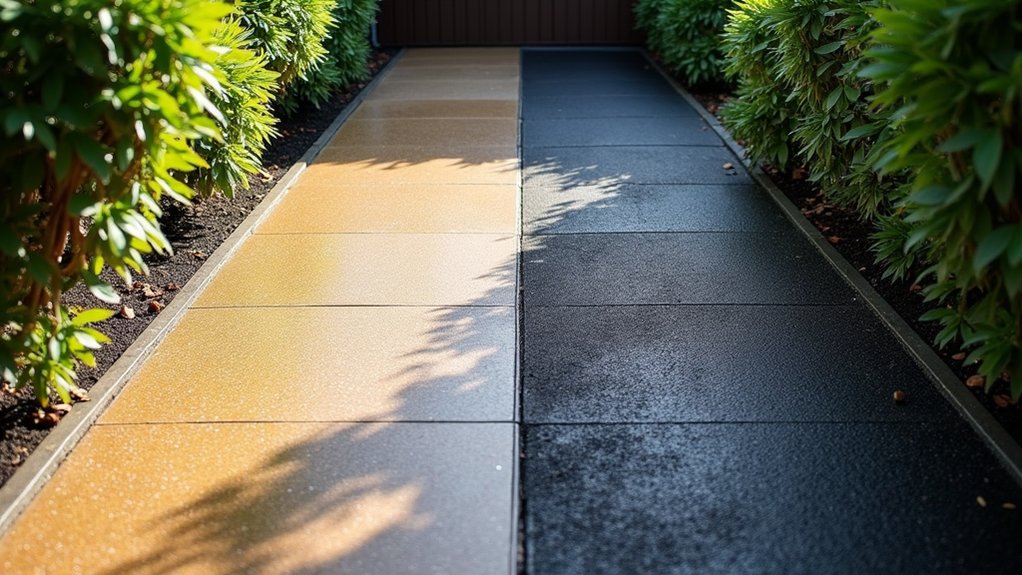Whilst resin-bound driveways cost more upfront than tarmac, they often prove better value for money. A resin surface lasts 20-30 years and needs little more than a quick sweep now and then. Tarmac, lasting 15-20 years, requires regular maintenance and can crack in harsh weather. The resin finish also looks smarter, with plenty of colour options to match your home’s exterior, which can boost your property value. Think of it like choosing between a basic mobile phone and a smartphone—the pricier option offers more features and tends to serve you better in the long run.
Key Takeaways
Resin vs Tarmac: The Real Cost Breakdown
Initial Costs:
Resin-bound surfaces cost £70-£100 per m², whilst tarmac comes in cheaper at £50 per m². For a typical UK driveway of 50m², that’s roughly £4,000 for tarmac versus £7,000 for resin.
Maintenance:
Tarmac needs regular upkeep – think resealing every few years and fixing those pesky cracks that appear after harsh winters. Resin stays sorted with just an occasional sweep and power wash.
Lifespan:
A resin driveway lasts 20-30 years, giving you an extra decade over tarmac’s 15-20 years. It’s like choosing between a Ford that’ll need replacing sooner or a Toyota that keeps going.
Property Value:
Estate agents often note that resin’s smart finish, with its range of colours and textures, can boost kerb appeal more than standard tarmac. Think of it as the difference between basic magnolia walls and a premium paint job.
Weather Benefits:
Our British weather makes resin’s permeable surface particularly valuable – no more puddles or flooding risks that you’d get with tarmac. It handles everything from Manchester drizzle to London downpours.
Material Costs Comparison
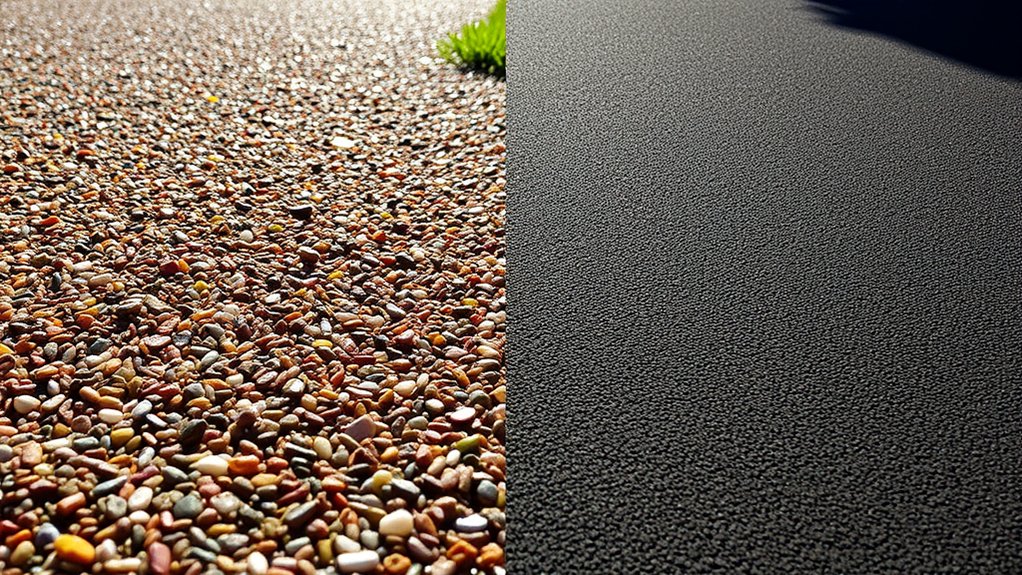
Resin-bound driveways cost between £70-£100 per square metre, whilst tarmac comes in at roughly £50 per square metre. Though tarmac is cheaper initially, resin offers better longevity and looks smarter on your property. Additionally, proper groundwork preparation is essential to prevent future driveway issues, making groundwork preparation a crucial consideration in the overall cost. Local prices vary across the UK, depending on labour costs and council requirements. Resin’s unique honeycomb structure also allows for sideways expansion, contributing to its durability and minimizing common failures over time. Resin also gives you more choice with different stone colours and patterns, unlike tarmac’s standard black finish. Your choice should factor in your budget, how long you plan to stay in your property, and what look you’re after for your home’s kerb appeal.
Installation Process and Time
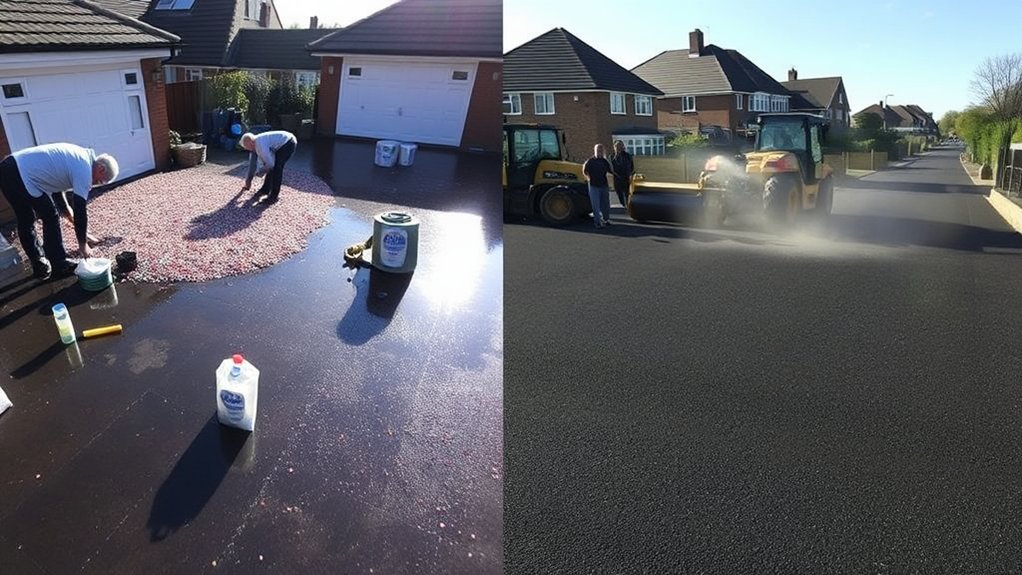
A resin-bound driveway takes longer to install than tarmac, with several key differences in the process. Resin installations require thorough groundwork and excavation, typically lasting several days, whilst the actual laying can span up to a week depending on British weather conditions. Proper surface preparation is essential for resin to ensure the best adhesion during installation. Curing time for resin can also extend the overall project timeline, as it often requires 24-48 hours to fully set before being used. Tarmac proves quicker, usually taking just one to two days to complete in suitable weather. Both methods can face delays from rain or cold – common challenges in the UK climate. The size of your driveway and your contractor’s expertise will ultimately determine the exact timeframe for either option.
Maintenance and Durability
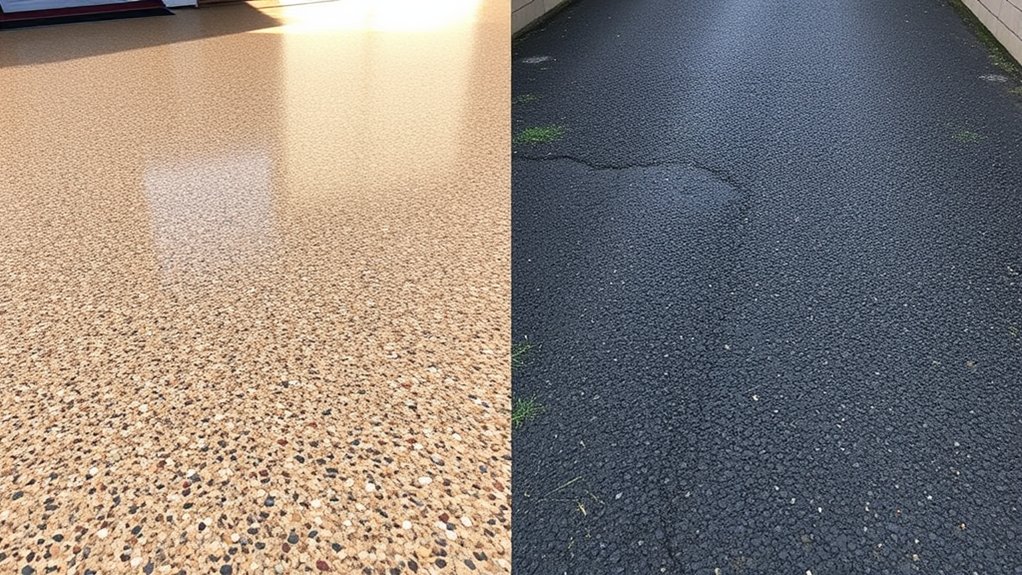
Maintaining your driveway properly ensures it stays in top condition for years to come.
Resin-bound surfaces need little attention – just sweep them occasionally and give them a quick wash with the garden hose to keep them looking fresh. Unlike traditional surfaces, they won’t stain from car oil and won’t collect puddles after rain, thanks to their porous nature. This permeable design helps to minimize surface runoff, further enhancing their appeal. Additionally, quality materials used in resin-bound surfaces contribute to their impressive longevity, helping to ensure they remain functional and aesthetically pleasing for an extended period.
Tarmac, whilst common across the UK, needs more looking after. You’ll have to seal it regularly and fill any cracks that appear, which adds to your costs over time.
Though both options are relatively hassle-free, resin driveways typically outlast tarmac and need fewer repairs. If you’re thinking long-term, a resin driveway often proves better value for money despite the higher upfront cost.
Aesthetic Appeal and Customization
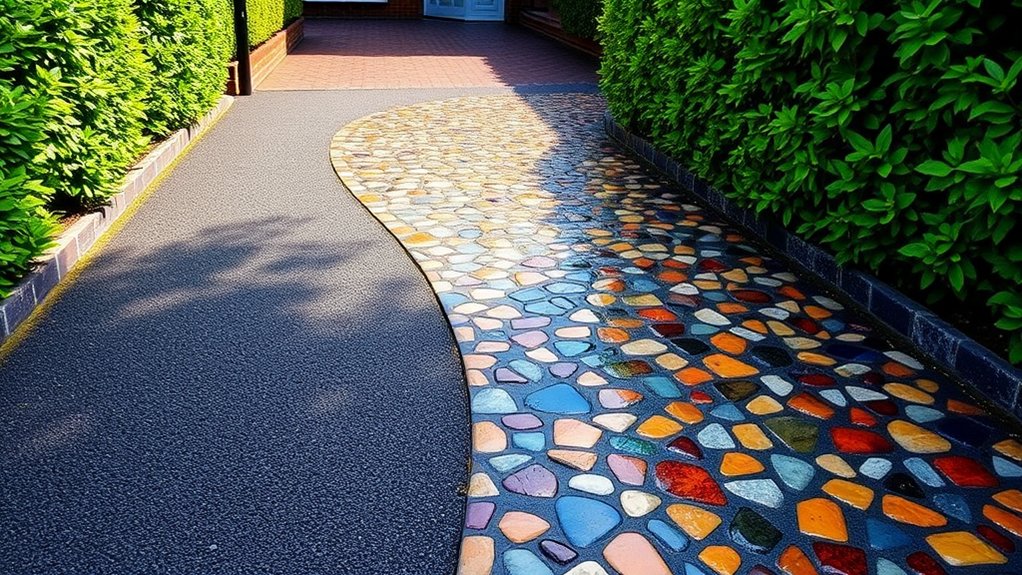
Resin-bound driveways offer far more visual options than traditional surfaces, with countless colours and finishes to choose from.
Whether you fancy a warm sandstone look or a modern grey blend, you can match your driveway perfectly to your property’s style.
Tarmac, whilst practical, comes only in black or dark grey, making resin the clear winner for homeowners wanting to create a distinctive look.
Color Variety Options
Resin-bound driveways offer far more colour choices than traditional tarmac surfaces.
Whilst tarmac comes mainly in black or dark grey, resin-bound materials let you pick from numerous shades, including warm browns, subtle greys and striking options like Champagne Pink.
These choices help match current design trends and can boost your home’s kerb appeal significantly.
The ability to blend different aggregates also creates unique textures and patterns that tarmac simply can’t achieve.
For UK homeowners wanting to personalise their driveway’s appearance, resin-bound surfaces provide greater creative freedom and visual impact.
Design Customization Potential
Resin-bound driveways offer excellent design flexibility to suit any British home. You can choose from a wide range of colours and patterns, from simple contemporary layouts to more detailed designs with company logos or family crests.
The material allows for precise cutting, making it perfect for creating clean edges and intricate patterns.
Popular choices include combining different coloured aggregates for borders, mixing light and dark stones for contrast, or adding decorative features around garden edges.
Many UK homeowners opt for natural stone blends that complement their property’s brickwork or garden landscaping.
The finish works brilliantly with both modern and traditional properties – think warm honey-coloured stone for country cottages or sleek grey blends for urban homes.
You can even incorporate practical elements like drainage channels without compromising the overall look.
Long-Term Performance and Savings
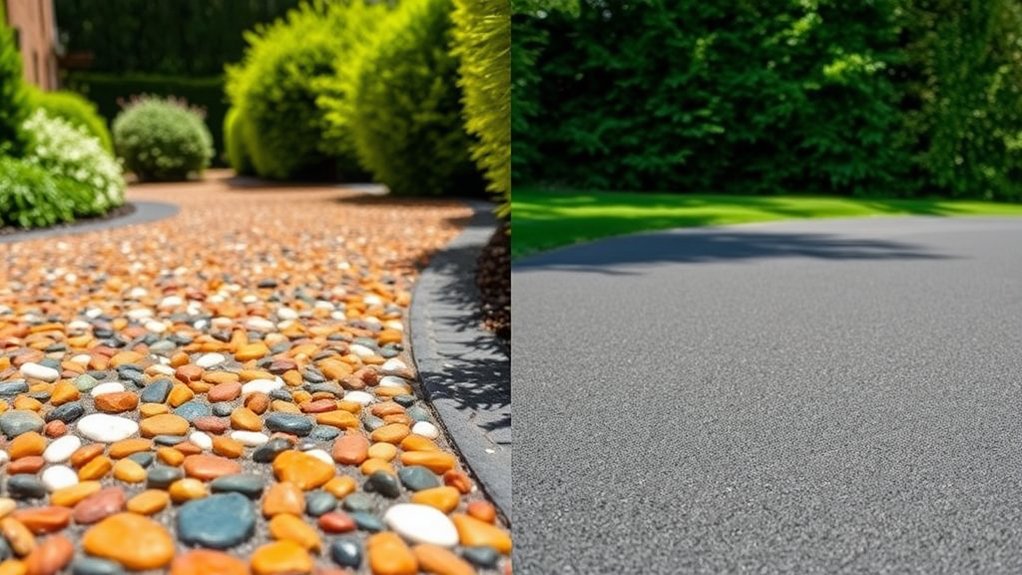
Comparing Resin-Bound and Tarmac Driveways: Long-Term Value
Long-term performance between resin-bound and tarmac driveways shows clear differences:
- Durability: Resin-bound surfaces typically last 15-25 years, whilst tarmac manages 15-20 years. Think of it like choosing between a standard and premium car tyre.
- Maintenance: Resin needs minimal upkeep – just occasional sweeping and cleaning. Tarmac often requires regular repairs for cracks and potholes, particularly after harsh British winters.
- Appearance: Resin-bound driveways maintain their smart look longer and boost property value. Tarmac tends to fade and look tired within a few years.
- Environmental Benefits: Resin allows rainwater to drain naturally, reducing puddles and flood risks – crucial for British weather. Tarmac creates water run-off issues.
The maths is straightforward: whilst resin costs more upfront, you’ll spend less over time on repairs and replacements.
For a typical UK home, resin-bound proves the smarter investment, delivering better value through durability and lower maintenance costs.
Practical Considerations for Homeowners
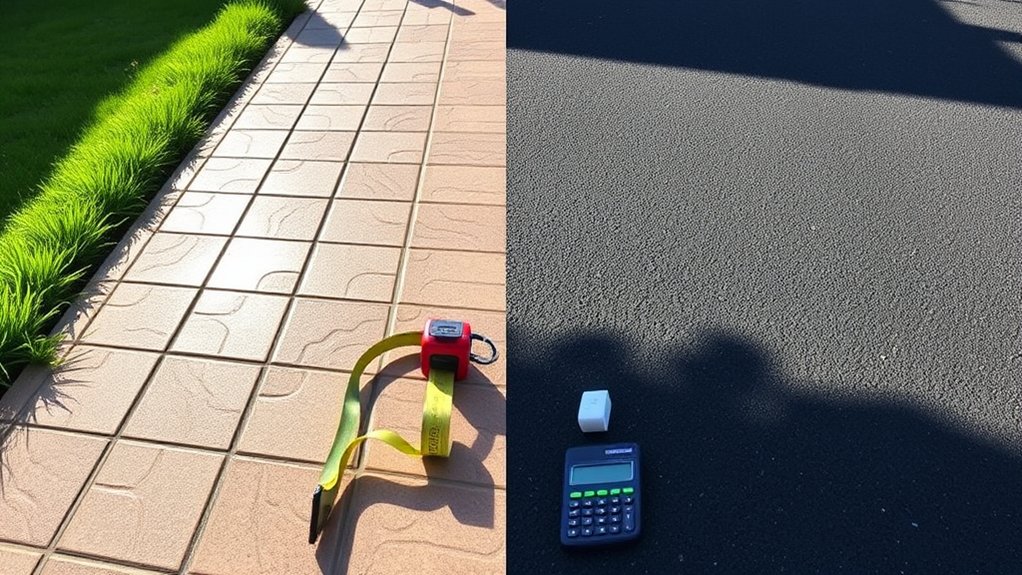
Choosing between resin-bound and tarmac driveways boils down to a few key factors.
Tarmac offers a straightforward, quick installation – typically completed within a day for an average-sized driveway.
Resin-bound surfaces need more preparation and can take 2-3 days to complete, as each layer must set properly.
Think of tarmac as the ‘ready-to-go’ option, whilst resin requires more patience but delivers a premium finish.
Both choices serve well in the British climate, though tarmac might need more frequent maintenance to keep it looking smart.
Your decision might come down to time constraints – if you need a rapid solution, tarmac’s your best bet.
Installation Speed Comparison
Installation Speed: Tarmac vs Resin-Bound Driveways
Tarmac and resin-bound surfaces differ notably in their installation times and requirements:
Tarmac
- Takes 1-3 days to install
- Works best in mild, dry conditions
- Lower labour costs due to quicker installation
- Can be used shortly after laying
Resin-Bound
- Typically needs 1-2 days
- More weather-dependent
- Requires thorough ground preparation
- Must cure fully before use
The British weather plays a crucial role – whilst tarmac copes better with varied conditions, resin-bound surfaces need specific temperatures and dry weather for proper setting.
Your choice might depend on when you need the driveway ready and your local weather forecast.
Both options suit different needs: tarmac offers a quicker, more cost-effective solution, whilst resin-bound provides a premium finish despite potentially longer overall completion times.
Surface Preparation Requirements
Essential Surface Prep for Driveways
Getting your surface preparation right is crucial whether you’re choosing tarmac or resin-bound surfacing. First, check your existing surface for cracks, loose material and stability – much like checking the foundations of a house.
Clean off any oil stains, moss or debris that could stop the new surface from sticking properly.
Good drainage is vital – nobody wants a driveway that turns into a pond when it rains. Your installer should assess whether you need a porous base layer to help water drain away naturally.
With resin, the surface must be bone dry before laying, whilst tarmac is more forgiving and can often go straight over existing surfaces.
Don’t skimp on prep work – sorting issues early saves money later. A proper survey of your current surface will reveal hidden problems and give you an accurate idea of costs.
Think of it as laying the groundwork for a driveway that’ll last for years to come.
Lifespan and Durability
Lifespan and Durability
Key points about driveway materials to help you choose wisely:
Lifespan: A properly installed resin-bound driveway lasts 20-30 years, whilst tarmac manages 15-20 years at best.
Durability: Resin-bound surfaces stand up well against cracking and keep weeds at bay. Tarmac tends to develop troublesome cracks and potholes, particularly after harsh British winters.
Maintenance: Resin needs minimal upkeep – just an occasional sweep and power wash. Tarmac often requires patching and resurfacing, especially after frost damage.
Environmental Impact: Both materials cope with British weather, but resin-bound surfaces prove more resilient to our wet climate and temperature changes.
Whilst resin costs more initially, its longer life and lower maintenance needs typically make it better value for money than tarmac over the years.
Frequently Asked Questions
Can I Install Resin or Tarmac Myself?
DIY installation of resin or tarmac is possible but comes with notable risks. Resin requires exact measurements and quick application before it sets, whilst tarmac needs specialist equipment and proper compaction. Both jobs demand professional-grade tools and technical know-how – if you’re not confident with similar building work, it’s worth calling in the experts.
How Can Weather Affect the Installation Process?
Weather conditions significantly impact driveway installation. Rain can waterlog the ground and compromise the foundation, whilst extreme temperatures affect how materials set and cure. Best to schedule installation during mild, dry weather – typically spring or autumn in the UK – to ensure proper results and avoid costly delays.
Are There Any Eco-Friendly Options for Tarmac?
Eco-friendly tarmac alternatives exist in the UK market, with recycled materials leading the way. Permeable paving offers a practical solution, allowing rainwater to soak through rather than create surface run-off. Popular options include recycled composite blocks and sustainable pavers, which require less upkeep than traditional tarmac whilst being better for the environment. These surfaces work particularly well for driveways and car parks, helping to reduce localised flooding during heavy British weather.
What Are the Best Uses for Resin Driveways?
Resin driveways work brilliantly for homes, garden paths and communal spaces across the UK. Their versatile design options and fuss-free upkeep make them a practical choice. Whether it’s a smart front drive in Manchester or a seaside property in Cornwall, resin surfaces deliver lasting durability whilst looking smart – a proper investment for any property.
How Does Drainage Influence Driveway Longevity?
Proper drainage and surface permeability are crucial for a long-lasting driveway. Good drainage prevents standing water, whilst permeable materials like gravel or special block paving help rainwater soak away naturally. Common issues in British driveways, such as frost damage and surface cracking, often stem from poor drainage – much like a waterlogged garden path. Installing the right drainage solutions and choosing suitable materials will significantly extend your driveway’s life.
Conclusion
Comparing resin-bound driveways to tarmac isn’t just about the initial price tag. Whilst tarmac offers a cheaper upfront cost, typically £20-35 per square metre, resin-bound surfaces (£40-70 per square metre) often work out better value long-term. A well-laid resin driveway lasts 15-20 years with minimal upkeep, compared to tarmac’s 5-10 years before needing repairs. Plus, resin-bound surfaces boost kerb appeal with their smart finish – much like the difference between basic tiles and quality stone flooring in your home. Factor in less maintenance and higher property value, and resin-bound becomes a savvy investment despite the higher initial outlay.
